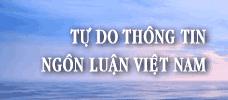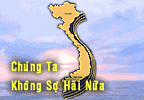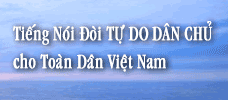


 |
 |
 |
| “Mọi
người có quyền tự do ngôn luận; quyền này bao gồm tự do tìm kiếm, tiếp
nhận và phổ biến mọi loại tin tức và ý kiến, không phân biệt ranh giới,
bằng truyền miệng, bản viết hoặc bản in, bằng hình thức nghệ thuật,
hoặc thông qua bất cứ phương tiện truyền thông đại chúng khác theo sự
lựa chọn của mình”
(Điều
19,2 Công ước Quốc tế về các quyền dân sự và chính trị, Liên Hiệp Quốc
biểu quyết năm 1966, Việt Nam xin tham gia năm 1982).
(Everyone
shall have the right to freedom of expression; this right shall include
freedom to seek, receive and impart information and ideas of all kinds,
regardless of frontiers, either orally, in writing or in print, in the
form of art, or through any other media of his choice.)
|
| T À I L I Ệ U
CHO LON, Vietnam -- When U.S. President George W. Bush arrives in Vietnam Friday, he will find a country that yearns for freedom. His visit, for the annual summit of the Asia-Pacific Economic Cooperation forum, will be an important test of how America balances the promotion of democracy with advancing U.S. business interests in this fast-growing economy. The Vietnamese people will be watching for signs that America has not abandoned them in their long struggle for freedom. Despite three decades of repression, the desire to be free of Communist dictatorship remains as strong as ever. Hundreds of thousands have died in this struggle. Concentration camps -- under the euphemism of "re-education" -- punished, often to the point of death, those who had sided with the U.S. until the fall of Saigon in 1975. Others perished in the desperate flight of boat people overseas, showing the world the lengths to which ordinary Vietnamese would go to escape tyranny. Many more have endured other forms of persecution. For instance, I've spent 20 of the past 30 years in detention simply for speaking out against oppression. I was imprisoned without trial from 1978-88 for my role in forming the Nationalist Progressive Front, an organization dedicated to promoting human rights in Vietnam. Then, in 1990, inspired by the democratic movements in Eastern Europe, a group of intellectuals, professionals, and university students including myself founded the Nonviolent Movement for Human Rights in Vietnam. Our manifesto, calling for a nonviolent struggle for a free, democratic and multiparty Vietnam, earned me eight years' hard labor, followed by a further five years' house arrest. No sooner did this end than I was put back in prison again, this time for criticizing the lack of freedom of information in Vietnam. Only in February last year was I finally released. Such repression has not stopped the ranks of dissidents from continuing to grow and embrace more sectors of Vietnamese society -- from religious leaders to farmers and workers. Increasingly, we have started to join together to form political parties, movements or alliances that directly challenge Communist rule. Take, for instance, Bloc 8406, a human-rights group named after the day of its formation, April 8, 2006. In the seven months since its launch, the group's Manifesto on Freedom and Democracy for Vietnam has attracted thousands of signatures. And last month saw the formation of the Alliance for Democracy and Human Rights, an umbrella group that brings together Bloc 8406, Buddhist and Catholic leaders, as well as my own Nonviolent Movement for Human Rights in Vietnam. Even those who dare not openly defy the Communist regime adopt passive forms of resistance. For instance, although the government refuses to allow private ownership of land, many peasants ignore this. Instead they buy and sell land using handwritten documents, resolving disputes through informal channels. A huge black market also allows Vietnamese to bypass the state-controlled system and do business without lining the party's pockets. Banned books and movies are widely circulated through an underground network. Realizing that the population is slipping out of their control, the Communist leadership has turned to the outside world to bolster its authority. Hence its enthusiasm for taking Vietnam into the World Trade Organization. By joining the global trade body, the party hopes to consolidate its dictatorship in two ways. First, by making false promises to improve human rights and the rule of law, the government hopes to defuse foreign pressure and make it more difficult for those of us fighting for democracy inside the country to secure international support. Second, the party aims to ensure that the benefits from the expected flood of foreign investment go primarily to its own members, in order to sustain continued support. That's not to dismiss the positive role that economic reform and free trade can play in increasing the free flow of information and loosening the party's grip on society. Moreover, the advent of economic freedom fosters the emergence of a larger and more prosperous middle class with aspirations for similar political freedom. Nonetheless, foreigners coming to do business in Vietnam need to think very carefully about whether their investments are doing more to promote democracy or to sustain a failing Communist regime. The U.S., with its long and honorable tradition of supporting human rights and democracy around the world, needs to think hardest of all. That means avoiding investments in state-owned companies, where the money will go straight into the party's coffers. It also means speaking out loudly and strongly in favor of human rights -- something President Bush will have an opportunity to do this week. He could, for instance, insist on meeting Vietnamese dissidents. Or the American president could use his visit to push Hanoi to set a timetable for fair and free elections, in which parties other than the Communists are allowed to compete. Whatever his chosen method, such gestures would go a long way to reassuring ordinary Vietnamese that America has not abandoned them in their long struggle against Communist oppression. .......................................................................................................................................... |